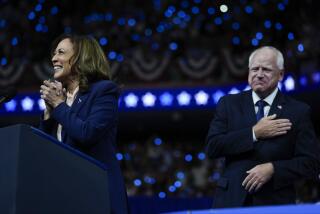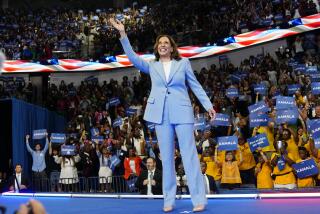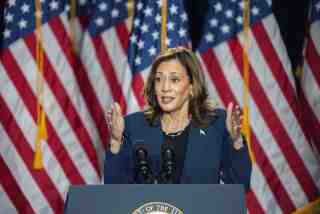Clinton Picks Gore as Running Mate in Break With Tradition : Democrats: Arkansas governor rejects geographical balance in choosing the Tennessee senator. Strategists believe his moderate positions can help unite divided party.
LITTLE ROCK, Ark. â Casting aside decades of conventional political wisdom that calls for balancing a ticket with contrasts, presumptive Democratic nominee Bill Clinton on Thursday named Tennessee Sen. Albert Gore Jr., a fellow young, Southern moderate, as his running mate.
âWe share a common philosophy that itâs time to move beyond old ideas,â Clinton said as he introduced Gore to a crowd of supporters gathered in sweltering heat on the lawn of the Arkansas governorâs mansion.
Gore, for his part, highlighted a key factor in what Democratic strategists hope will be the ticketâs appeal: âThroughout American history, each generation has passed leadership to the next,â he said. âThat time has come again.â At ages 45 and 44, respectively, Clinton and Gore will be the youngest ticket a major party has ever fielded.
In past elections, Democratic candidates almost always have sought running mates who represented a different wing of the party. John F. Kennedy, for example, selected Lyndon B. Johnson from Texas. Johnson, in turn, chose the partyâs leading liberal, Hubert H. Humphrey. And Jimmy Carter, feeling a need to reassure liberals, chose Humphreyâs protege, Walter F. Mondale.
This time, however, Clinton chose a running mate who comes close to being an ideological clone. And that decision reflects a fundamental strategic gamble on Clintonâs part resting on two beliefs: Clinton strategists argue that his moderate policy positions can unite the disparate Democratic coalition without the balance provided by a more liberal running mate. They also believe that the way to reach voters is to send a message that is consistent, rather than one with a broad gauge.
âIn a three-person race,â said Clintonâs pollster, Stanley Greenberg, âthe key is definition.â Picking a running mate who dramatically differed from Clinton would merely confuse voters about what Clinton stands for--something that many voters already have questions about, he said. By contrast, picking a similar running mate will help voters understand who Clinton is, he said.
In picking Gore, Clinton has tried âto reinforce his ticket rather than balance it,â said Al From, a longtime Clinton adviser.
âWe believe in our message. We wanted someone compatible,â said Clinton adviser Frank Greer.
The two men do have some different strengths, which they stressed in their speeches. âTogether, we will finally give the United States a real environmental presidency,â Clinton said, after citing Goreâs work on global warming, ozone depletion, energy conservation and other environmental issues. With his own environmental record relatively weak, Clinton hopes Goreâs strong environmental credentials will help, particularly in California and elsewhere in the West.
Clinton also praised Gore as a âleading expert in foreign policy, national security and arms control,â all areas in which Clinton, as a governor, has had little experience.
But it was to the themes of change and renewal that the two repeatedly returned and which they and their strategists hope their candidacies will come to symbolize for Americans.
Campaign officials believe that the image of two young, vibrant men will serve as a marked contrast to both President Bush and presumed independent candidate Ross Perot, both of whom are in their 60s, and will have great appeal in a year when many voters say they want to see a fundamental change in the country and its government.
Bush and the Republicans âhave run out of ideas, theyâve run out of energy, theyâve run out of the ability to inspire our people,â said Gore in a foretaste of a key argument the Democratic candidates plan to make repeatedly over the next four months.
Democratic strategists concede, however, that the choice may also carry considerable political risk. Bush, in particular, can be expected to argue he deserves reelection because he possesses experience and mature judgment. And at least some polls have indicated that while older voters find the idea of change appealing, members of the baby boom generation have doubts about putting a fellow baby boomer in the nationâs highest office.
Age and ideology are not the only characteristics the Democratic running mates will share. From the moment the two men--dressed in all but identical blue suits and flanked by their wives and a passel of young, tow-headed children--appeared on the portico of the mansion to wave to the crowd below, the similarities were overwhelming.
Never have two candidates who identified themselves as Southerners run together as a ticket. (In 1948, Harry S. Truman of Missouri and Alben W. Barkley of Kentucky teamed up, but Truman called himself a Midwesterner.) Not in 160 years has a ticket had two men with Ivy League educations. Both have outspoken wives who have taken strong, sometimes controversial, stands on issues involving children and families.
Republican officials believe they can portray Hillary Clinton as excessively liberal for her advocacy of government day care programs and other causes, while Mary Elizabeth (Tipper) Gore has attracted considerable attention with her campaigns for warning labels on rock music whose lyrics seem to advocate sex, drugs or violence.
Clinton and his aides have played down geographic considerations in the selection of a running mate. Warren Christopher, the Los Angeles attorney who headed the selection team, said Clinton told him at the outset of the search, in April, that he believed notions of geographic ticket-balancing were outmoded examples of âold politics.â
Nonetheless, the placing of two Southerners on the ticket underscores the fact that Clinton strategists believe they have a strong chance of winning an array of Southern and border states that Republicans traditionally have been able to count on in presidential contests and that the way to achieve that goal is to appeal to disaffected, mostly white, Democratic voters who have abandoned the partyâs presidential tickets for more than 20 years.
Because of Perotâs presence in the race, which cuts strongly into Bushâs support among Southern whites, âthe so-called Republican electoral lock has vanishedâ in the South, said Clinton campaign manager David Wilhelm. âSome of the Southern states are in play, no question about it.â
Some recent polls would appear to back up that claim. A poll released Wednesday by the Charlotte (N.C.) Observer, for example, showed Clinton, Bush and Perot in a dead heat in that state--one of the largest in the South.
Some Democrats--particularly those from the liberal wing of the party--have argued that Clintonâs only hope of winning Southern states would be to pick a running mate who would generate a large turnout of black and other minority voters.
âIt takes two wings to fly and here you have two of the same wing,â complained the Rev. Jesse Jackson. Jackson noted that he has a good personal relationship with Gore--something he lacks with Clinton--but added that Clintonâs âmethod so far of building coalitions is a rather innovative one.â
âWhen you look at the Clinton-Gore ticket, itâs Southern, basically conservative,â Jackson said.
Clinton aides disagree.
âWhatâs wrong with that argument is that it fundamentally underestimates the appeal of Bill Clintonâs message and program to the Democratic base,â Wilhelm argued. The key to Clintonâs success, his aides believe, is that he has been able to appeal to more conservative voters without alienating blacks and other members of the partyâs core constituency.
While Jackson criticized the ticket as too conservative, Republican officials were quick to attack Gore as a closet liberal whose record belied his claims to be an assertive moderate.
A list of âtalking pointsâ circulating Thursday afternoon among Republican leaders labeled Gore as âClintonâs tax-and-spend twin brotherâ and âthe most liberal senator from a Southern stateâ--a charge Bush advisers repeated constantly throughout the day.
In fact, Goreâs voting record has been more liberal than most Southern senators, and in some years, by some measures, has been the most liberal of the group. He has hardly been alone, however. His fellow Tennessean, Jim Sasser, as well as Wyche Fowler Jr. of Georgia, Terry Sanford of North Carolina, and the two senators from Clintonâs home state--Dale Bumpers and David Pryor--all have relatively liberal records. In some years, both Sasser and Bumpers have compiled notably more liberal voting records than Gore.
Bush campaign spokeswoman Torie Clarke chose a different line of attack, arguing that in choosing Gore, âtheyâve picked somebody trying to compensate for Clintonâs real weaknesses.â
vl,3
âBill Clinton chose not to serve in the military, so they chose someone who did. Bill Clintonâs got a lousy environmental record, so they chose someone known as an environmentalist. I think they feel insecure about traditional family values and Tipper is a way to make up for that,â Clarke said.
From Clintonâs own party, however, the reaction--other than Jacksonâs--was largely favorable.
Former California Gov. Edmund G. (Jerry) Brown Jr., for example, praised Goreâs environmental credentials, which Clinton aides hope will help the ticket, particularly in California. The choice âreflects a recognition that environmental issues are very, very important,â Brown said, although he also called on Clinton to make âa specific environmental commitment that gives voters a clear standard to judge by.â
And Gore drew praise from one particularly unexpected source--Perot.
âHeâs a fine man--wonderful family--and I think heâs an excellent choice,â Perot said.
Times staff writer Douglas Jehl contributed to this story.
OTHER POLITICAL COVERAGE: A22, 27, 29
Harvard, Vietnam on Goreâs Resume
Here is a thumbnail sketch of Sen. Albert Gore Jr. of Tennessee, who has agreed to be Bill Clintonâs running mate on the Democratic ticket: Born: March 31, 1948, Washington, D.C. Parents: Former Sen. Albert A. Gore Sr. (D-Tenn.) and Pauline. Education: Harvard, bachelorâs degree in government with honors, 1969; attended Vanderbilt University law school and divinity school but did not graduate. Religion: Baptist. Vietnam experience: Spent six months as Army reporter outside Saigon. He observed combat but never fought. Political triumph: As presidential candidate in 1988, he received the biggest total vote of any candidate on Super Tuesday, when 14 Southern states held primaries. House, Senate career: Gore, at the age of 28, was elected to the House of Representatives from a rural Tennessee district in 1976 in his first campaign for public office. He easily won reelection to three more terms in the House before winning a Senate seat in 1984. He was easily reelected in 1990. Family: Wife, Mary Elizabeth (Tipper) Gore; four children, Karenna, Kristin, Sarah and Albert III.
GOREâS ELECTION SCORECARD
Winning Office Year percentage Senate 1990 68% Senate 1984 61% House 1982 Unopposed House 1980 79% House 1978 Unopposed House 1976 94%
HIS KEY VOTES IN THE SENATE Authorize use of force against Iraq: For Amendment to prohibit flag desecration: Against Parental notice for minorsâ abortions: Against Halt production of B-2 Stealth bomber at 13 planes: Against 1990 Civil Rights Act: For Reduction in NATO forces: Against Reductions in Salvador Aid: For
LEADING THEME: ENVIRONMENTAL PROTECTION Authored âEarth in the Balance,â a book on the environment . . . Principal sponsor of resolution creating Earth Day, 1990 . . . Has traveled to Antarctic to study the hole in the ozone layer and to Brazil to study deforestation . . . Called on all nations to phase out chlorofluorocarbons, which harm the ozone layer.
Sources: Congressional Quarterly; Current Biography Yearbook; Almanac of American Politics; Associated Press
More to Read
Get the L.A. Times Politics newsletter
Deeply reported insights into legislation, politics and policy from Sacramento, Washington and beyond. In your inbox three times per week.
You may occasionally receive promotional content from the Los Angeles Times.











